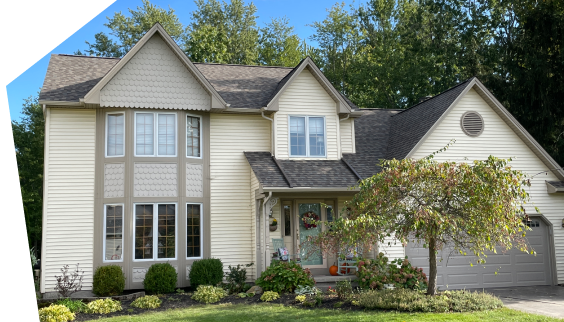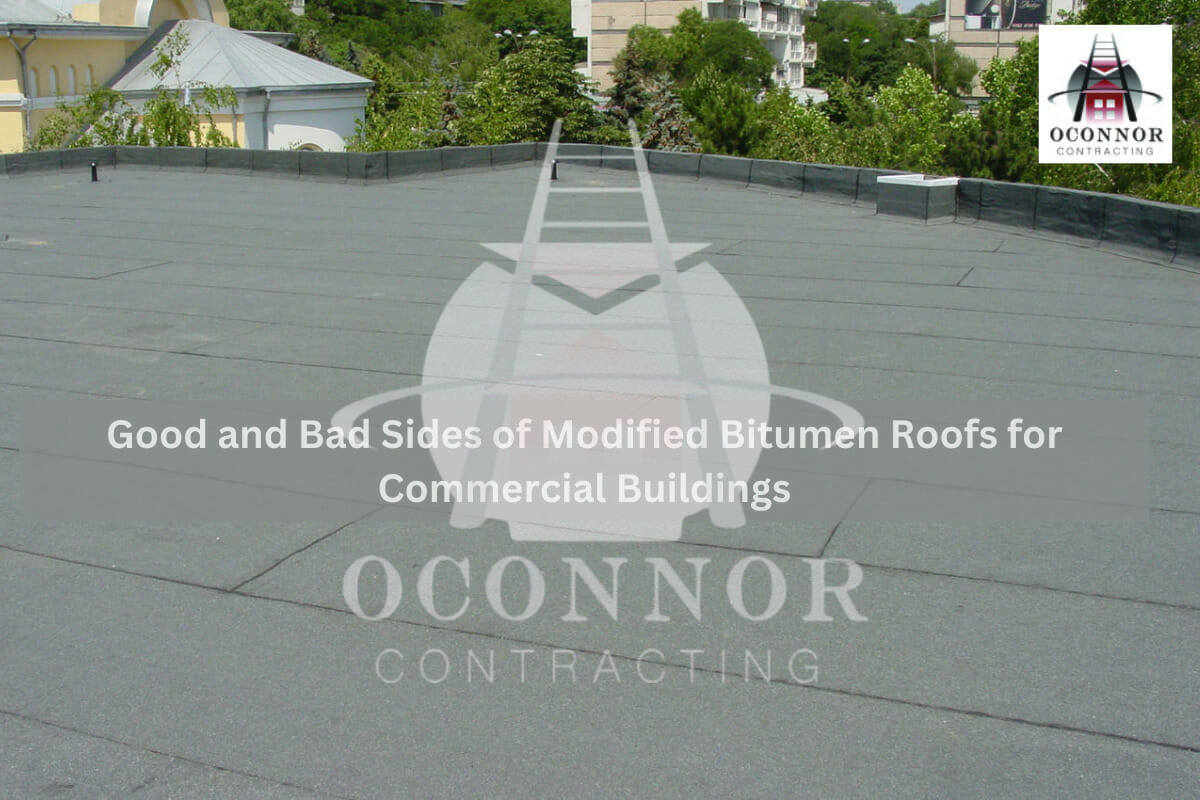As a property owner or manager, choosing the right roofing material is one of the most critical decisions you’ll make regarding your commercial building. The roof plays a vital role in protecting your building, its contents, and the people inside. Therefore, selecting a durable, reliable, and cost-effective roofing material is essential to ensure the longevity and integrity of your commercial building.
As a commercial roofing expert, I can say that modified bitumen roofs are among the most durable flat roofing materials. So I’m here to help you understand how this roofing system can be an excellent investment for your business. In this blog post, I’ll share all the benefits you can enjoy from a modified bitumen roof.
What is a Modified Bitumen Roofing System? Understanding the Science Behind its Success
If you want to understand whether this flat roofing material is a profitable investment for you, you should start with the basics. A roof made of modified bitumen has multiple layers, and it’s suitable for most types of business applications. It creates a robust roofing system with an asphalt protection board, a rubber-modified bitumen base sheet, and the top layer, a rubber-modified bitumen cap sheet.
- The board provides strength and stability.
- The base sheet adds flexibility and weather resistance.
- The top layer offers waterproofing, UV protection, and color retention.
The bitumen is modified using polymers known as SBS polymers, commonly used in shoe soles and tires. While it can also be fortified using fiberglass or polyester as an alternative, rubber is still the most sturdy modifier, and an experienced roofing contractor will always recommend a reliable material for your project.
Let’s learn about the characteristics of this roofing system.
How a Modified Bitumen Roof Can Benefit Property Owners
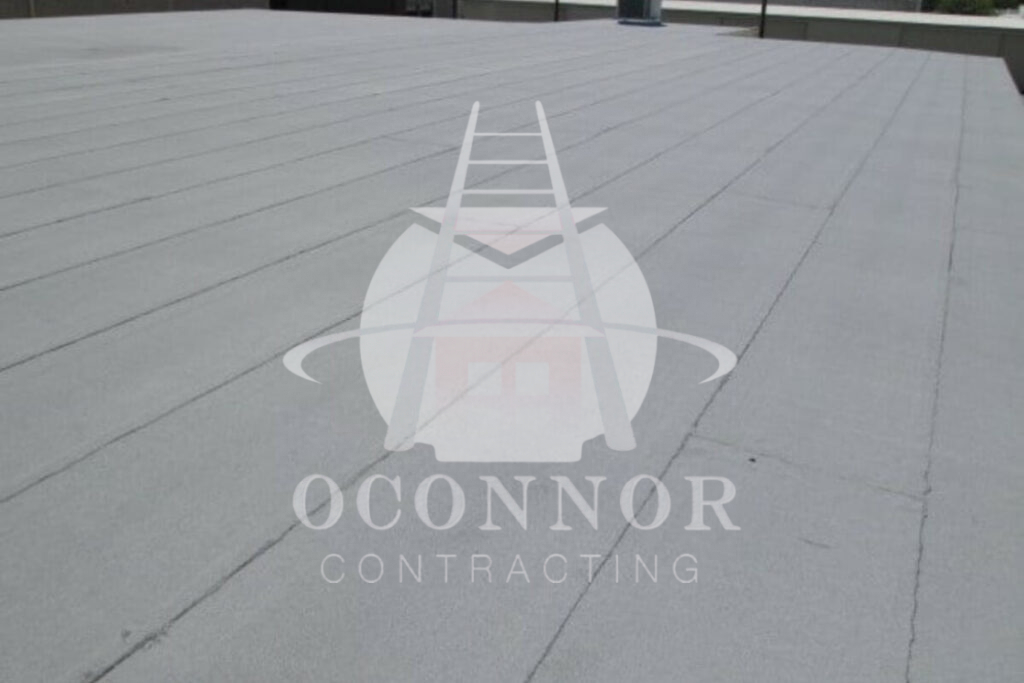
When it comes to weather resistance, a fortified bitumen roof is no less resistant than TPO or EPDM. These roofs are specifically designed to withstand the harshest of weather conditions, ensuring the protection of your commercial building. Here are some key high-performance characteristics:
#1 Resistance to Heat and UV Radiation
This type of roof is formulated with UV-resistant materials that prevent the breakdown of the roofing system under prolonged exposure to sunlight. This feature helps maintain the roof’s integrity and extends its lifespan.
#2 Ability to Withstand Temperature Fluctuations
From scorching summers to freezing winters, polymer-modified bitumen offers exceptional resistance to summer heat and snowy days. Such a roof can resist harsh temperatures without cracking or compromising its waterproofing capabilities.
#3 Resistance to Hail and Impact Damage
Hailstorms can be a nightmare for property owners, but you can expect less damage with a modified bitumen flat roof. Due to their multiple reinforced layers, these roofs are more resistant to impact damage.
#4 Excellent Waterproofing Properties
Water damage can lead to significant issues, such as mold growth, interior damage, and compromised structural integrity. So the multiple layers and seamless installation of this roof are focused on providing superior protection against leaks and water-related problems.
#5 Durable Material for Mild Climates
The incorporation of modifiers and other reinforcing materials naturally enhances the strength and flexibility of mod-bit roofs. This reinforcement makes them less susceptible to cracking, splitting, or becoming brittle over time. This characteristic ensures that the roof remains intact and provides lasting protection for up to 20 years. However, if your building is in a storm-prone area, this lifespan can reduce with high-intensity storms.
#6 Protection Against Wind Uplift
High winds can exert significant pressure on a roofing system, potentially leading to roof failures. But you can prevent this from happening by choosing the hot, torch-down installation method for this roof.
#7 Resistance to Harsh Chemicals, Including Acids and Solvents
Modified bitumen roofs are designed to withstand exposure to a wide range of harsh chemicals commonly found in industrial environments. They exhibit adequate resistance to acids, solvents, oils, and corrosive substances.
Potential Drawbacks of Mod-Bit Roofs
In regards to the disadvantages of this roof, there are a few of them, depending on your business. This roof may not be a highly profitable solution for a few types of climates and business activities, so here’s what you need to know:
- Mod-bit roofs are more prone to water pooling than other types of flat roofs, such as EPDM and TPO membranes. This is also the case with a built-up roof since it has tar and gravel as the top layer.
- During the installation of this roof, especially with torch-down methods, there can be a noticeable odor due to the heating of the bitumen material. Check if this can affect your business operations and for how long.
- The lifespan of a mod-bit roof can vary depending on several factors, including the specific product used, installation quality, climate conditions, and maintenance practices. While this roof typically lasts 20 years with proper care, some cheaper versions may have a shorter lifespan.
When you compare this material to others, like built-up roofs and roll roofing, it can give you a better understanding of what properties or qualities you need and what other roofs have to offer.
Built-Up Roofs vs. Modified Bitumen
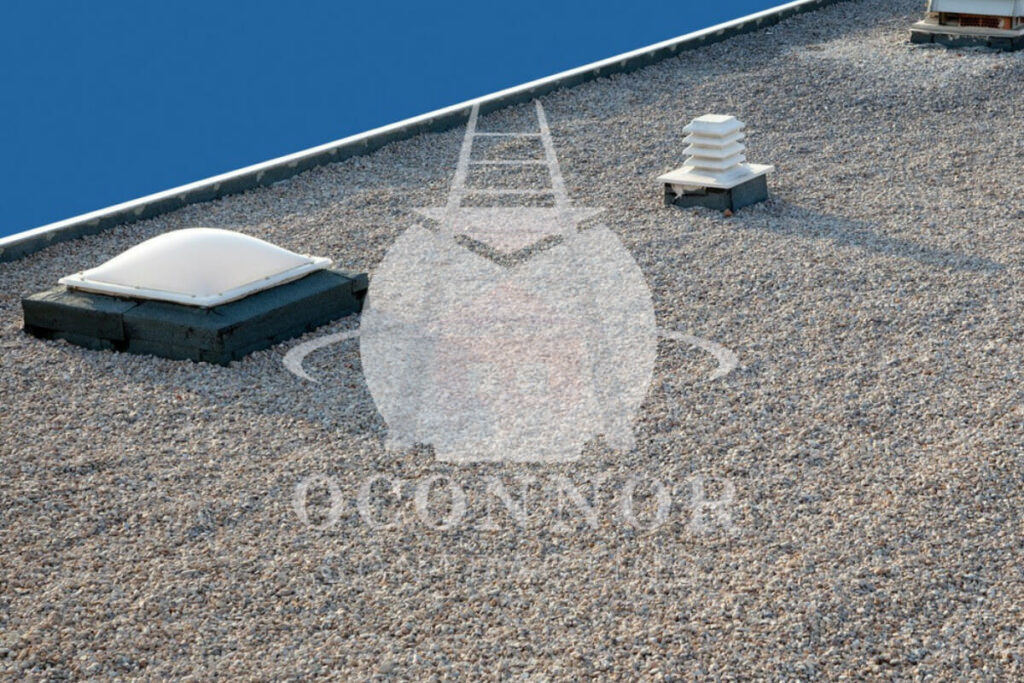
Built-up roofing systems, also known as BURs, have a long history and are known for their durability and ability to withstand heavy foot traffic. A BUR system is composed of multiple layers of roofing felt alternated with asphalt or coal tar bitumen. These layers are then topped with gravel or a reflective coating.
Both roofing systems offer good weather resistance, but if you want a more durable roof, then you should know that built-up roofs have a longer lifespan of 20 to 40 years. That’s due to the higher amount of layers and a thicker surface. However, this roof can be prone to leaks and cracks, and can also be more costly to install and maintain than modified bitumen roofs.
So, in terms of durability and cost, a better alternative to both of these roofs would be the famous EPDM rubber roof. It has the same level of durability but is more sturdy than built-up roofs.
Modified Bitumen vs. Roll Roofing
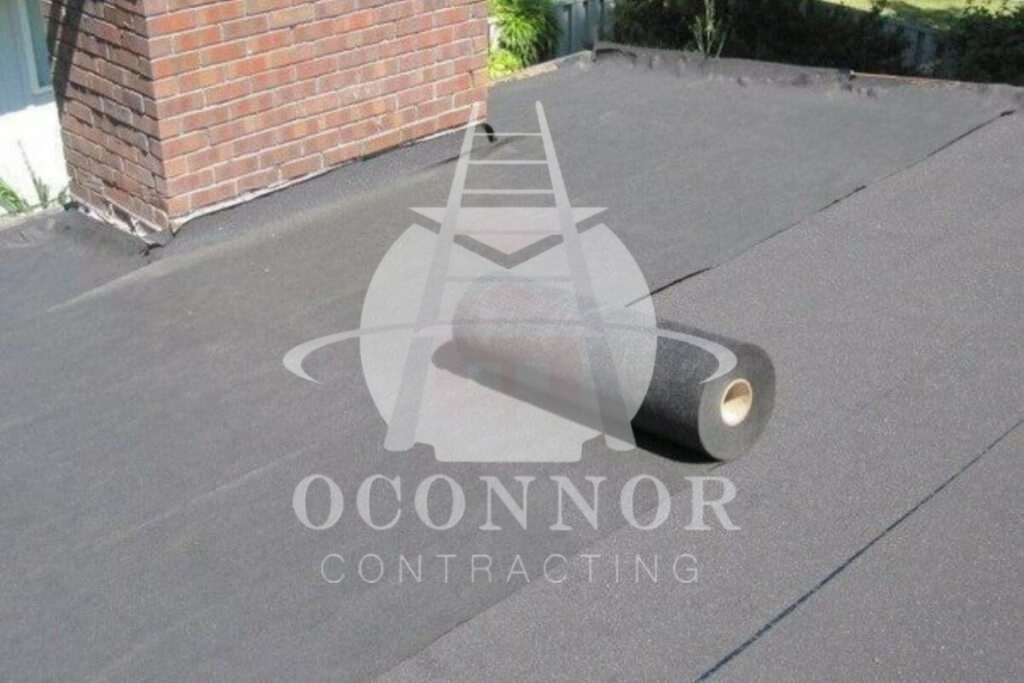
The first difference is in the composition of these two roofs. Roll roofing is not much different than modified bitumen roofing systems. This type of roof consists of a single layer (or single ply) of asphalt material that comes in large rolls. Roll roofing is typically used for temporary structures, such as sheds or garages. It’s more affordable and has a simpler installation process, but it is less durable than modified bitumen roofs.
A mod-bit roof offers superior durability, with a lifespan of 20 years or more, while roll roofing typically lasts around 5 to 10 years. Modified bitumen also provides better resistance against the weather, including UV radiation, temperature fluctuations, and impact.
In terms of cost, roll roofing is generally more affordable, but its shorter lifespan may result in long-term maintenance and multiple replacement expenses.
Finally, it’s time to talk about the cost of a modified bitumen roof. Being a field expert, I know that the overall cost of roofing does not end after installation. So now I’ll discuss how much you might pay for a mod-bit roof considering all these factors.
Modified Bitumen Roof Cost
When considering a roofing project for your commercial building, understanding the cost implications is crucial. Reinforced bitumen roofs offer an attractive combination of durability, weather resistance, and affordability. According to HomeGuide, the average cost to install a modified bitumen roof ranges from $4.00 to $7.50 per square foot.
Here are the factors that may affect your roofing cost:
The Particular Product Used
The cost can vary depending on the specific products chosen for your roof. The most common type is SBS-modified bitumen, followed by APP bitumen. Some brands also manufacture hybrid versions of this roof, with a thicker or higher number of membranes.
Different brands and manufacturers may offer varying prices based on factors such as the modification process, the quality of materials, and warranty coverage. It’s essential to evaluate the product options available and select one that balances performance, durability, and cost-effectiveness.
The Installation Method
The installation method employed for modified bitumen roofs can impact the overall cost. Torch-down application, self-adhesive, and cold-applied methods each have a different set of requirements for labor and equipment, which can influence the installation expense. Torch-down installation, for example, may involve additional labor costs due to the specialized equipment and skilled labor required.
The Number of Layers Used
The number of layers in a modified bitumen roof system can affect the cost. Some projects may require additional layers for enhanced durability, insulation, or other specific requirements. Each additional layer adds to the material and labor costs, so it’s vital to assess the needs of your commercial building and consult with roofing professionals to determine the optimal number of layers for your project.
As you can see, modified bitumen material offers a comprehensive package of benefits for commercial buildings. Their ability to withstand diverse weather conditions, resist chemicals, provide energy efficiency, and offer design versatility makes them a compelling choice.
Potential concerns with this roofing material can also be mitigated with the use of a proper roof coating, flawless installation, and the use of high-quality membranes from reputable brands. You should start by taking advantage of a free consultation, which many roofing contractors offer, including our company, OConnor Contracting. This is a helpful way to get started on your project without paying anything upfront and worrying about the costs.
Free Consultation and Estimate on Flat Roofing
If you want to install a modified bitumen roof in Buffalo or the surrounding area in New York, you can trust the team at OConnor Contracting. We have been working with different types of commercial roofs for many years, and know how the weather can affect flat roofs in our state.
Call us at (716) 600-7663 to schedule your free consultation, and one of our experts will help you by providing relevant information in an easy-to-understand manner.
